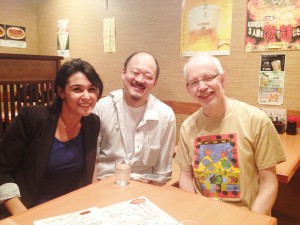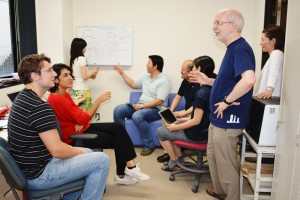ELSI Blog
3 A Day at ELSI
At the warm invitation of Piet Hut of ELSI, we have just landed in Tokyo. Zach Adam and I are excited to share our research with ELSI members, who span a diverse array of disciplines and fields dedicated to studying the earliest origins of life and evolution on Earth.

Me, Daisuke Kiga, and Piet Hut enjoying some tasty 'Hiroshima style pancakes' for lunch.
Wednesdays are a busy day at ELSI, since these are the days for both lunch hour discussions and afternoon ELSI seminars. The lunch discussions are relatively informal, consisting of two speakers who introduce a topic of their choosing in five minutes, with the rest of the group asking questions and contributing to the discussion for another 15-20 minutes as we all eat lunch together. The meeting format is surprisingly challenging, since the attendees come from a variety of backgrounds (e.g., astronomy, planetary geology, chemistry, biology, etc.) and the five minutes must include any background information that others unfamiliar with the topic may need in order to contribute to the discussion. Both Zach and I were pretty used to this challenge after many years spent in astrobiology circles, where interdisciplinary discussions are the norm rather than the exception. I gave a lunch presentation about mechanisms of protein promiscuity in the context of the evolution of complex cellular systems and diversification of life. Zach, for his lunch talk, introduced one of most enduring challenges in evolution- how to measure and compare biological complexity across all taxa.
The ELSI afternoon seminar, on the other hand, has a much more expansive format (45 mins presentation, with 15-20 mins for questions and conversation). My talk went quite well, with many of the ELSI members being at the forefront of my type of work (potential biological applications of ancestral sequence reconstruction). The members even directed me to an article by Satoshi Akanuma, whom I got to meet during my second presentation at the Suzukake campus. Akanuma's publication had come out during our flight to Tokyo, covering the resurrection of nucleoside diphosphate kinases. This work shows that these proteins also follow an increasing thermostability trend as one goes back in time; similar to the ancient Elongation Factor proteins I am currently working with.

Me, in red, engaging in an informal ELSI discussion
I was so excited during my talk that I completely forgot about my incipient jet lag, powering through to discussions into the evening. After a busy day filled with many meetings and discussions, Hanako Ricciardi of ELSI was kind enough to take us out to dinner, and recommended an exquisite sushi and sashimi place in the Oimachi center above the train station. I have tasted a lot of fish growing up in Istanbul, but Hanako surely treated us to some of the freshest fish I have ever had. She also answered many of our questions about living in Tokyo. Thank you, Hanako!











